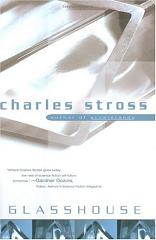
Glasshouse
Charlie Stross
335 pages
published in 2006
The problem with keeping up with Charlie Stross these past few years is that it seems he has been writing books more quickly than I could read or even buy them. Which makes it extra nice, if I'm allowed a little gloat here, that he send this book to me when his partner came over for the Amsterdam bokbeer festival. A totally unexpected gesture that certainly put me in a good mood towards this book. Not that was really needed; I would've gotten Glasshouse anyway, as Stross has been on my "buy in hardcover" list almost from the first time I read his fiction back in 2001 or so. Before that I knew him as an interesting poster on various Usenet groups like rec.arts.sf.written and the scary devil monastry; it's been interesting to see how much of his interests then crop up in his fiction now, as they do here.
Glasshouse is a standalone novel, which has somewhat of the flavour of Accelerando, though it is somewhat less manic and exhuberant, in that it's set in what you can call a post-singularity society sometime in the far future. The main character has just put himself through a memory laundering process, losing almost his entire history and memories. He knew he was in someway involved in the Censorships Wars, but he has no idea what he did or even who he was, just that he had to undergo this radical memory restructuring so he could be left alone. Unfortunately almost from the moment he starts his new life, he's aware he's under observation and even attack from forces unknown. He needs a safe place to hide for awhile until whoever is after him loses interest.
Enter the Glasshouse, a polity deliberately cut off from all contact in order to conduct an enormous experiment in social science: to reconstruct the Dark Ages, the period from the mid-twentieth to the mid-twentyfirst century in which the development of humanity underwent an acceleration that took it from the darkness of primitive natural life into a recognisable modern pattern of life. The period is called the Dark Ages because that's the time humanity first started to use digital storage media and communication protocols and so much of the existing data was lost due to deteriorating storage, unreadable obsolete protocols and deliberate attemps at obfucation that little knowledge remained on how the societies of these times looked or how the acceleration happened. Hence this experiment, ideal for Robin to hide himself in...
Once on the inside he gets a bit of a shock though when it turns out he's now a woman named Reece, forced to life in a society hopelessly backward and primitive not just in its technology, but also its attitudes to gender relationships, the horrible ancient society of 1990s and 2000s Earth... Worse, it becomes gradually clear that the researches behind the project are not nearly as benign as they made out they were and are manipulating events to create a society shaped to their ideals and use it as a weapon in the outside world in some way.
To be honest, it took me three tries to finish this. The problem I had the first two times I started reading Glasshouse was the changeover between the interesting far future Stross sketches in the first forty pages and the caricature of present day society that Robin finds himself in from then. It's always difficult to convincingly portray the ideas a future society could have about our own times, without having it descent into either a broad satire on current society or a farce that let's you laugh at what these silly future people think of us. For the most part Stross succeeded in this, but the start of this section was bumpy. Once over the bump however, I finished it in one sitting.
There was one other problem I had with the plot as such, which was that the resolution happened too quickly. Most of the book was spent in setup and once the bad guys were identified and their plans were known, they were overcome rather too quickly for my liking. The heroes seemed slightly too competent, the villians somewhat too complacent.
Speaking of competence, though Robin is technically a "he" for the most part of the book he was a "she" and as such he reminded me of two of Charlie's other heroines, Rachel Mansoor (out of Singularity Sky and Iron Sunrise) as well as Miriam Beckstein (out of The Family Trade): techy, competent, smart, thrown into dangerous situations in which they have to get out mostly by their own strengths. And they do so in broadly similar ways, by making smart use of technology their adversaries are blind to.
Glasshouse is Charlie's fourth novel in four years to be nominated for the Hugo Award. So far he hasn't won one yet (though he did win a novella Hugo in 2005 for "The Concrete Jungle"); if Glasshouse wins it's not undeserved.
Read more about:
Charlie Stross,
Glasshouse,
science fiction,
book review